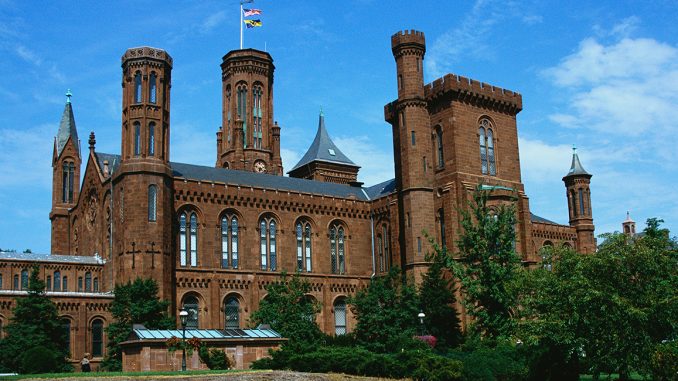
That leftists have accomplished a very successful march through the institutions is a fact of life. But how did they achieve it? The ongoing saga of the Smithsonian’s Latino Museum can serve as a classic case study of how the Left conquered the commanding heights of the culture.
Spoiler alert—here’s how it always happens: Determined leftists who understand the importance of capturing institutions—and seek to use their newfound power to indoctrinate the population into a narrative that counters the national worldview—convince society that all they are doing is giving voice to the voiceless. Conservatives who are either well-intentioned, naive, or fearful of being tarred as racists go along with the agenda and approve everything.
This is what has happened with the Smithsonian’s Latino and Women’s History Museums.
Only now, some conservatives have realized their mistake. Just last month, Republicans in the House Appropriations Committee introduced a policy rider that defunds the Latino Museum, which has yet to be built, and its initial exhibit, the Molina Family Gallery, which is being shown at the Smithsonian Museum of American History.
They were undoing a vote they took three years ago—and more than 20 years of history leading up to that point.
In July 2020, after years of debate, the organizers behind the museum, the Friends of the National Museum of the American Latino, finally convinced Republicans in the House to support their initiative. As a result, the House unanimously passed legislation to create the National Museum of the American Latino.
One lone senator stood up against the tide: Mike Lee, R-Utah. He had the courage and foresight to say:
The last thing we need is to further divide an already divided nation with an array of segregated, separate-but-equal museums for hyphenated identity groups.
But Lee’s opposition was overcome. In December 2020, funding for both the Latino and Women’s History Museums was tucked into the gigantic COVID-19 stimulus package, which tipped the scales at almost $900 billion. That legislation passed the House 359-53, and then, on Dec. 21, 2020, it passed the Republican-controlled Senate by 92-6.
On the evening of Dec. 27, then-President Donald Trump signed the almost $1 trillion measure he had called a “disgrace” only days earlier, thereby approving the museums.
That legislative history was the culmination of decades of efforts. The push for the Latino Museum originated in a 1994 report, when a task force led by Raul Izaguirre, president and CEO of the radical group La Raza from 1974 to 2004, charged that the Smithsonian “displays a pattern of willful neglect” toward Latinos. The report demanded several things, including greater representation.
La Raza’s involvement should have been a red flag from the start. The group was created in 1969, with funding from the Ford Foundation, by 1960s radicals intent on balkanizing the country with the creation of a new government category—Hispanics.
But the establishment, again, folded: The Smithsonian created a Latino Center in 1997. And in 2008, in President George W. Bush’s last year in office, Congress named a presidential commission that called for the museum’s creation. La Raza’s fingerprints were, again, all over it.
The Friends of the Latino Museum then worked hard on the Republicans in Congress, promising all sorts of good things. If you click on the website of the Friends of the Latino Museum, for example, you will find nothing but apple-pie language: “Our Story: One of family, patriotism, hard work, ingenuity, and pride in the country we’ve all built together. American Latinos are veterans, artists, athletes, business leaders—active participants in every walk of life.”
But that is the opposite of the reality that is the Molina exhibit. It is a Marxist abomination that portrays Latinos as army deserters, traitors, drag queens, and overall victims. And if that seems odd, it shouldn’t, because to the Left, these are good things.
The exhibit is so awful that Republicans on the Appropriations Committee, led by Americans of Hispanic descent from Florida and Western states, finally said “basta” and added the defunding policy rider in July. They had been mugged by reality.
However, the exhibit shouldn’t have caught anyone by surprise. It is exactly what La Raza would have wanted. I and others warned for years that a Latino museum would be a hothouse for incubating grievances against the United States since so much of historical preservation had been captured by the Left.
There are almost no more art history departments, for instance, that produce curators who won’t jump at the opportunity to create a narrative of oppressor vs. oppressed or depict our country as systemically racist. These faculties were taken over by cultural Marxists as far back as the 1980s.
To take but one example, Harvard’s Faculty of Arts and Sciences, FAS, is one of the most left-leaning departments at what is already a very leftist university. According to the Harvard Crimson’s last study on its faculty giving, of all 183 FAS affiliates, “96% of donations to federal campaigns and candidates went to Democrats.”
The Smithsonian itself is outrageously woke. Just this month, nine Republican senators sent new nominees to lead the institution a letter asking them for their views on the institution’s promotion of radical race and sexual theories and of religious discrimination. The Women’s History Museum, said the senators’ letter, “plans to include materials featuring biological men who claim to be women.”
This is how the Long March happened. It is a great sign of progress, of course, that some in Congress are finally fighting back. But whether Republicans will have the intestinal fortitude to permanently defund the Smithsonian’s woke museums, much less the long-term strategy to reverse the Left’s institutional dominance, very much remains to be seen.
This piece originally appeared in the Washington Examiner.
Have an opinion about this article? To sound off, please email letters@DailySignal.com, and we’ll consider publishing your edited remarks in our regular “We Hear You” feature. Remember to include the URL or headline of the article plus your name and town and/or state.

